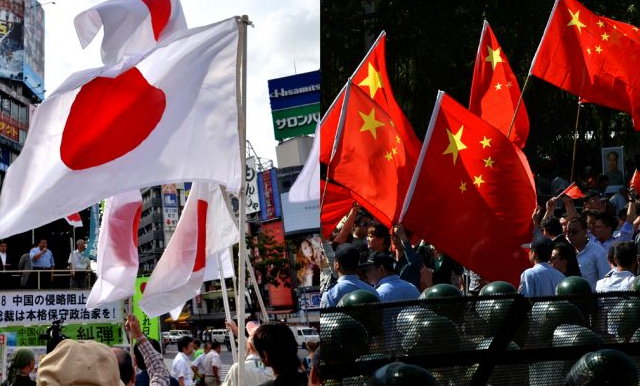 (Photo Credit: MARK RALSTON/RIE ISHII/AFP/Getty Images)
(BGF) – In this article, featured in The Globalist, J.D. Bindenagel looks to Europe in 1914 in an attempt to distill lessons for Chinese-Japanese relations. As Bindenagel notes, the outbreak of WWI demonstrated that economic and trade ties alone cannot necessarily prevent the onset of war and conflict. Thus, in order to avoid conflict China and Japan must find a way to “turn enmity in amity”. Bindenagel then provides four potential steps that can taken to successfully manage the tensions between Japan and China. The article can be viewed below as well as on The Globalist’s website.
(Photo Credit: MARK RALSTON/RIE ISHII/AFP/Getty Images)
(BGF) – In this article, featured in The Globalist, J.D. Bindenagel looks to Europe in 1914 in an attempt to distill lessons for Chinese-Japanese relations. As Bindenagel notes, the outbreak of WWI demonstrated that economic and trade ties alone cannot necessarily prevent the onset of war and conflict. Thus, in order to avoid conflict China and Japan must find a way to “turn enmity in amity”. Bindenagel then provides four potential steps that can taken to successfully manage the tensions between Japan and China. The article can be viewed below as well as on The Globalist’s website.
Europe 1914: Lessons for China and Japan in 2014
By J.D. Bindenagel
Japan’s Prime Minister Shinzo Abe recently likened the tensions between Japan and China to the relationship between Germany as a rising power challenging the United Kingdom 100 years ago. He certainly had a point when he noted that trading relations and investments had not stopped the brewing conflict in Europe a century ago from engulfing the world in war.
It is ominous that China and Japan are currently so keen on butting heads. After all, this is 2014. People throughout Asia must nervously reflect on the hard lessons the Europeans learned.
Europeans are revisiting the Great War on the 100th anniversary of its outbreak in August 1914 after Gavrilo Princip, a local terrorist in Serbia, not one of the major belligerent countries, assassinated the Archduke Franz Ferdinand of Austria and launched a global war. The failure of European leadership a century ago brought calamity to Europe.
Domino-style, that war brought on a veritable tumbling of major empires, beginning with that led by the Russian Tsar, the Austro-Hungarians and the Ottomans. It also destroyed the foundations of the global economy and European governance. Fascism and dictatorship followed in the 1930s that led to the Second World War and the Cold War.
In East Asia leaders can consider these lessons, remember that economic relations offer no guarantee that rising powers will rise peacefully and prevent the world from sleepwalking into war.
The real challenge, whether then in Europe or now in Asia, is how to turn enmity into amity. Then as now, the best way to proceed is to begin with small steps in the resolution of many disputes. And this is where Japan’s Prime Minister must do much more than (implicitly) point the finger at China.
There is no denying that China suffered humiliation from the Japanese Imperial Army invasion in the Sino-Japanese Wars. Little wonder, given the absence of an apology from Japan, that the Second World War continues to feed Chinese anger.
This is part of the sentiments that are surfacing in thecompeting claims for the Senkaku/Diaoyu Islands in the East China Sea. The lack of recognition of the wartime conquest of Nanjing and Prime Minister Abe’s visit to the controversial Yasukuni shrine remain significant symbols of lack of justice for China.
Unlike the cultural context of Europe that respects apologies that accept responsibility for suffering brought on by the National Socialist regime in the Germany of World War II, Japan and China seem caught in a cultural context where shame is associated with apology.
German President Johannes Rau apologized to the victims of Nazi Germany in 1999, which was respected by the millions of living victims who suffered in the name of the German people. Unfortunately, reconciliation from the bitter events of the Second World War would be ideal, but resolution of all these issues is not likely.
There are several steps that can be taken to successfully manage these tensions:
1. Chinese, Japanese and regional leaders should set aside the use of force to resolve the tension. A code of conduct in the South China Sea is necessary to manage maritime operations.
2. the parties should engage with each other in clarifying narrative to promote mutual understanding and prevent angry populisms and xenophobic nationalism that can rebound to destroy leaders and countries.
3. Japan, China, Vietnam should set aside the unresolved issues and turn to joint management of national interests in fishing, energy and resource development. The Gulf of Tonkin-Hainan agreement between China and Vietnam is one example.
4. The United States should provide needed leadership among parties to create and share historical narratives that can lead to better understanding, maritime policing, adherence to the Law of the Sea and maintenance of the freedom of the seas for shipping, while helping to avoid political miscalculation and military confrontation.
Click here to view the article on The Globalist.